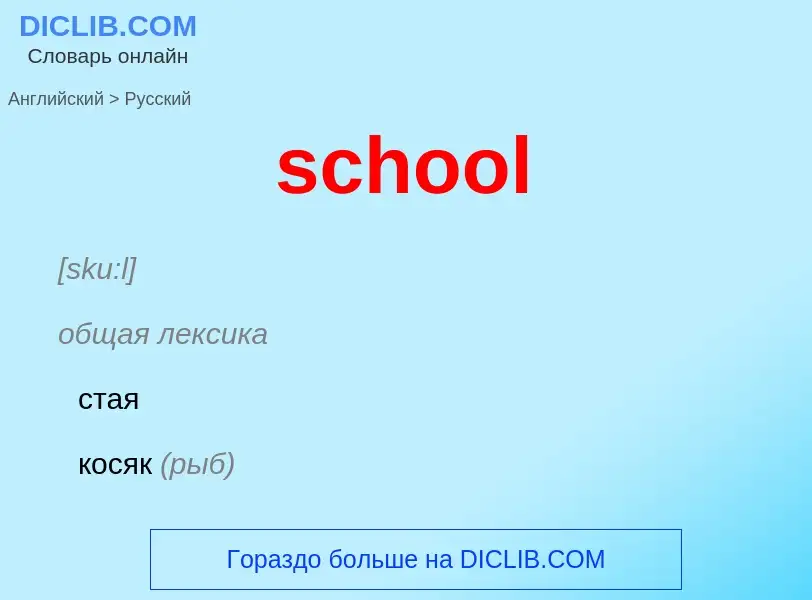Traducción y análisis de palabras por inteligencia artificial ChatGPT
En esta página puede obtener un análisis detallado de una palabra o frase, producido utilizando la mejor tecnología de inteligencia artificial hasta la fecha:
- cómo se usa la palabra
- frecuencia de uso
- se utiliza con más frecuencia en el habla oral o escrita
- opciones de traducción
- ejemplos de uso (varias frases con traducción)
- etimología
School - traducción al Inglés
[sku:l]
общая лексика
стая
косяк (рыб)
стадо (китов)
собираться стаями
косяками или стадами
учебный
училище
учиться в школе
школа
экзамены на ученую степень
разговорное выражение
факультет, отделение (в Оксфордском университете [Oxford University])
Смотрите также
существительное
[sku:l]
общая лексика
школа
учебное заведение
курсы
учение
обучение
образование
выучка
опыт
занятия
уроки (в школе)
класс
классная комната
школьная аудитория
направление
институт
колледж
академия (в Древней Греции и Древнем Риме)
факультет университета
отделение
(the Schools) здание Оксфордского университета (где принимают публичные экзамены на учёную степень)
средневековые университеты
преподавание или образование в таком университете
средневековая схоластическая философия
экзамены (обыкн. на учёную степень)
косяк
стая (рыб)
собирательное выражение
учащиеся школы
школьники
музыка
руководство
учебно-методическое пособие
история
когорта или рота императорской гвардии
устаревшее выражение
толпа
сборище
большое количество
масса
глагол
[sku:l]
общая лексика
обуздывать
дисциплинировать
сдерживать
приучать (к чему-л.)
тренировать
воспитывать
дрессировать
собираться косяком
плыть
идти косяком (о рыбе)
устаревшее выражение
посылать в школу
давать образование
учиться в школе
получать образование
- Banking School
- Cambridge School
- Chicago School
- Classical School
- Currency School
- Harvard Business School
- Historical School
- Lausanne School
- Liberal School
- London School of Economics
- Manchester School
- Marginalist School
- Marginal Utility School
- Neoclassical School
- New Economics School
- Older Historical School
- Optimist School
- Organic School
- Orthodox School
- Ricardian School
- Younger Historical School
Definición
Wikipedia

A school is an educational institution designed to provide learning spaces and learning environments for the teaching of students under the direction of teachers. Most countries have systems of formal education, which is sometimes compulsory. In these systems, students progress through a series of schools. The names for these schools vary by country (discussed in the Regional terms section below) but generally include primary school for young children and secondary school for teenagers who have completed primary education. An institution where higher education is taught is commonly called a university college or university.
In addition to these core schools, students in a given country may also attend schools before and after primary (elementary in the U.S.) and secondary (middle school in the U.S.) education. Kindergarten or preschool provide some schooling to very young children (typically ages 3–5). University, vocational school, college or seminary may be available after secondary school. A school may be dedicated to one particular field, such as a school of economics or dance. Alternative schools may provide nontraditional curriculum and methods.
Non-government schools, also known as private schools, may be required when the government does not supply adequate or specific educational needs. Other private schools can also be religious, such as Christian schools, gurukula (Hindu schools), madrasa (Arabic schools), hawzas (Shi'i Muslim schools), yeshivas (Jewish schools), and others; or schools that have a higher standard of education or seek to foster other personal achievements. Schools for adults include institutions of corporate training, military education and training and business schools.
Critics of school often accuse the school system of failing to adequately prepare students for their future lives, of encouraging certain temperaments while inhibiting others, of prescribing students exactly what to do, how, when, where and with whom, which would suppress creativity, and of using extrinsic measures such as grades and homework, which would inhibit children's natural curiosity and desire to learn.
In homeschooling and distance education, teaching and learning take place independent from the institution of school or in a virtual school outside a traditional school building, respectively. Schools are organized in several different organizational models, including departmental, small learning communities, academies, integrated, and schools-within-a-school.


![[[Albert Bettannier]]'s 1887 painting ''La Tache noire'' depicts a child being taught about the "lost" province of [[Alsace-Lorraine]] in the aftermath of the [[Franco-Prussian War]] – an example of how European schools were often used in order to inoculate [[Nationalism]] in their pupils. [[Albert Bettannier]]'s 1887 painting ''La Tache noire'' depicts a child being taught about the "lost" province of [[Alsace-Lorraine]] in the aftermath of the [[Franco-Prussian War]] – an example of how European schools were often used in order to inoculate [[Nationalism]] in their pupils.](https://commons.wikimedia.org/wiki/Special:FilePath/1887 Bettannier Der Schwarze Fleck anagoria.jpg?width=200)

![One-room school in 1935, [[Alabama]] One-room school in 1935, [[Alabama]]](https://commons.wikimedia.org/wiki/Special:FilePath/Farm Security Administration school in Alabama USA 1935.gif?width=200)
![schools]] every Monday morning, With the aim of educating discipline and a sense of national spirit schools]] every Monday morning, With the aim of educating discipline and a sense of national spirit](https://commons.wikimedia.org/wiki/Special:FilePath/Flag ceremony routine activities in Indonesian schools2022.jpg?width=200)
![[[Loyola School, Chennai]], India – run by the [[Catholic Diocese of Madras]]. Christian missionaries played a pivotal role in establishing modern schools in India. [[Loyola School, Chennai]], India – run by the [[Catholic Diocese of Madras]]. Christian missionaries played a pivotal role in establishing modern schools in India.](https://commons.wikimedia.org/wiki/Special:FilePath/Loyola School.jpg?width=200)
![Online class in Greece, October 2021. Online classes have been very common during the early 2020s, due to the mass closures of schools as a result of the [[Covid pandemic]]. Online class in Greece, October 2021. Online classes have been very common during the early 2020s, due to the mass closures of schools as a result of the [[Covid pandemic]].](https://commons.wikimedia.org/wiki/Special:FilePath/Online class in Greece, October 2021.jpg?width=200)
![[[Plato]]'s academy, [[mosaic]] from [[Pompeii]] [[Plato]]'s academy, [[mosaic]] from [[Pompeii]]](https://commons.wikimedia.org/wiki/Special:FilePath/Plato's Academy mosaic from Pompeii.jpg?width=200)
![CCTV]] [[surveillance]] cameras. This is especially common in schools with [[gang activity]] or violence. CCTV]] [[surveillance]] cameras. This is especially common in schools with [[gang activity]] or violence.](https://commons.wikimedia.org/wiki/Special:FilePath/Warning signs at CHS.jpg?width=200)
